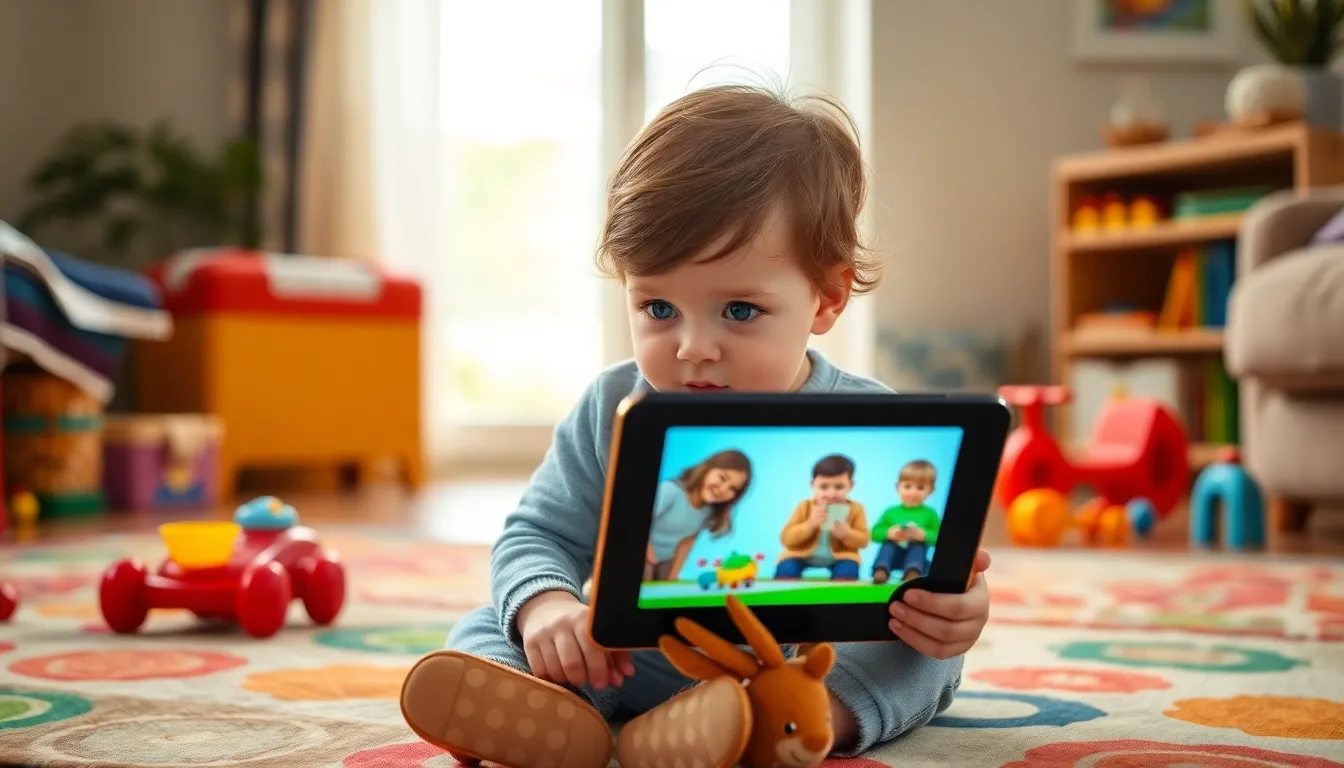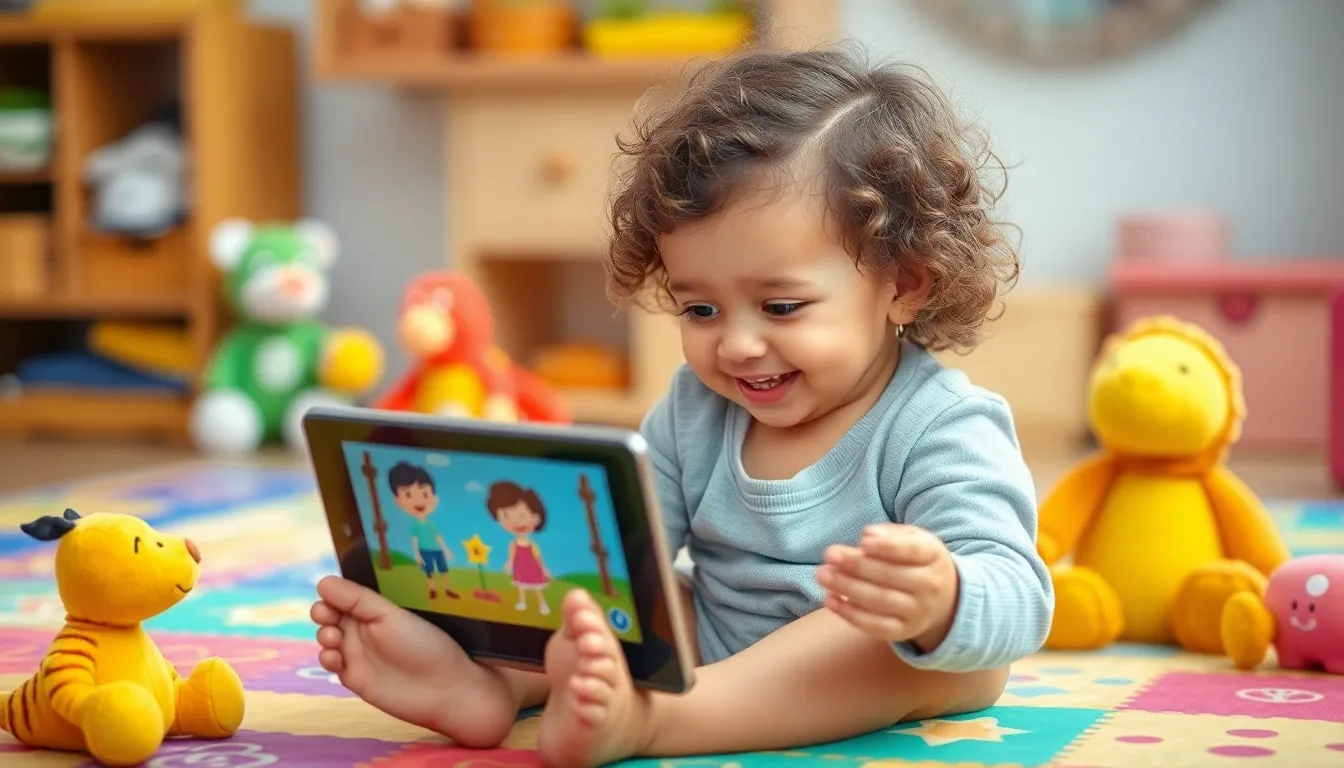Table of Contents
ToggleIn a world where toddlers seem to have an unquenchable thirst for knowledge and a knack for mischief, educational videos are like the superhero sidekick every parent needs. These engaging visual tools turn learning into an adventure, capturing tiny attention spans while sneaking in valuable lessons. Who knew that a dancing dinosaur could teach counting or that a singing cat could introduce the alphabet?
Parents often find themselves in a daily battle against screen time, but educational videos can transform that struggle into a win-win. With vibrant colors and catchy tunes, these videos not only entertain but also lay the foundation for essential skills. So why not let your little ones giggle and learn at the same time? Dive into the world of educational videos, where fun meets learning, and watch as your toddler’s curiosity blossoms into a lifelong love for knowledge.
Overview of Educational Videos for Toddlers
Educational videos for toddlers serve multiple purposes. They capture young children’s attention while imparting knowledge. Many parents rely on these videos to supplement traditional learning methods. Instructional content often covers basic skills like numbers, letters, and colors. These videos usually employ colorful animations, engaging characters, and cheerful music to maintain interest.
Variety exists among educational videos. Some focus on language development, while others teach social skills or problem-solving. Content creators design videos to align with early childhood education standards. Popular platforms offer a wide range of options, ensuring parents find suitable material for their toddlers.
Quality matters when selecting educational videos. Parents should look for age-appropriate content that promotes active viewing. Videos featuring interactive elements encourage participation, making learning more effective. Research indicates that children learn better when they engage with content rather than passively watching.
Visual and auditory elements play significant roles in successful educational videos. Bright colors and clear visuals enhance understanding, while sound effects and music foster engagement. Many videos also incorporate simple narratives that kids can follow easily, promoting comprehension.
Educational videos help shape learning experiences. They provide a modern solution to screen time management. Parents appreciate the chance to blend fun and education seamlessly. Choosing the right videos lays the foundation for a love of learning in toddlers. Educational videos play a significant role in a child’s early development and engage them in meaningful ways.
Benefits of Educational Videos


Educational videos for toddlers provide numerous advantages in their early learning journey. They serve as effective tools that merge fun with education, capturing children’s attention and engaging them in meaningful ways.
Cognitive Development
Cognitive skills improve significantly through educational videos. These videos stimulate problem-solving abilities by presenting fun challenges, encouraging toddlers to think critically. Engaging visuals and dynamic animations capture attention, making it easier for children to absorb new concepts. Videos often provide interactive elements, which foster active participation and enhance retention of information. Research indicates that children exposed to educational content show higher levels of curiosity and creativity. Clarity in concepts is achieved through repetition, allowing young minds to reinforce their understanding of essential ideas.
Language Acquisition
Language skills develop rapidly with the help of educational videos. Children are introduced to vocabulary and sentence structure in an engaging context. Repetitive phrases and catchy songs strengthen listening skills, promoting language comprehension. Exposure to diverse accents and conversational styles enhances phonetic recognition. Educational videos often showcase narrators who speak clearly, aiding in pronunciation. When toddlers imitate characters, they practice verbal skills naturally and enjoy learning. By incorporating visuals that represent words, these videos support vocabulary building in a memorable way. Studies show that children who engage with educational videos demonstrate improved language acquisition abilities compared to those without this resource.
Popular Educational Video Genres
Educational videos for toddlers come in several engaging genres, each catering to different learning needs.
Animated Series
Animated series capture attention through colorful visuals and lively characters. These series often introduce foundational concepts such as numbers, letters, and shapes. Preschoolers respond well to animation because it stimulates imagination and creativity. Popular examples include “Sesame Street” and “Peppa Pig,” both designed to teach through entertaining storytelling. Each episode typically features catchy songs and relatable scenarios, enhancing memory retention and engagement.
Live-Action Content
Live-action content provides real-life context, helping toddlers connect with the world around them. This genre often involves real people demonstrating everyday activities or basic concepts. Programs like “Blue’s Clues” and “Blippi” promote interaction, encouraging children to observe and participate. Visual role models present in live-action content enhance communication skills through relatable dialogues and actions. Parents appreciate this genre for its ability to combine fun with practical learning experiences.
Tips for Choosing Educational Videos
Selecting the right educational videos for toddlers requires thoughtful consideration. Parents can enhance their child’s viewing experience by focusing on age-appropriate content and ensuring high content quality.
Age Appropriateness
Choosing videos that match a toddler’s developmental stage fosters comprehension and engagement. Content designed specifically for young children often includes simple language, basic concepts, and relatable scenarios. These elements make learning enjoyable and accessible. Videos should reflect the child’s interests, as engaging themes spark curiosity. Reviewing recommended age ratings on video platforms also aids parents in making informed choices. Educational videos tailored for toddlers effectively lay a strong foundation for future learning.
Content Quality
Quality content distinguishes effective educational videos from mere entertainment. Parents should prioritize videos that emphasize educational objectives, such as teaching numbers, letters, or social skills. Look for clear narration, visually engaging graphics, and positive messaging that reinforces learning. Research shows that high-quality videos enhance cognitive development and language skills. Engaging storytelling and interactive elements further enrich the viewing experience. Recommendations from trusted sources and reviews can guide parents in finding videos with lasting educational value, ensuring that screen time remains productive and beneficial.
Potential Downsides of Video Exposure
Video exposure can present various downsides for toddlers, despite educational benefits. One significant concern involves over-exposure, which may lead to reduced physical activity. Children who spend excessive time watching videos often miss opportunities for outdoor play and active movement, crucial for their development.
Attention span also poses a challenge. Extended screen time can reduce toddlers’ ability to focus during non-screen activities and may create reliance on fast-paced stimuli found in videos. This can hinder their patience and self-regulation skills, making it difficult for them to engage fully in learning experiences that require sustained attention.
Another downside relates to social interaction. Toddlers who prefer screens over face-to-face interactions may struggle to develop essential social skills. Real-life communication enhances emotional understanding, yet video engagement often lacks the necessary interpersonal dynamics.
Screen time at crucial developmental stages can also affect sleep patterns. Studies indicate that toddlers exposed to screens close to bedtime may experience difficulties winding down, leading to disrupted sleep schedules. Consequently, inadequate rest can impact mood and cognitive function during waking hours.
Lastly, parents must be cautious about content quality. Not all educational videos are suitable for toddlers, and it’s vital to assess content accurately. Videos that prioritize entertainment over education can mislead and distract, potentially negating the intended developmental benefits.
Balancing video exposure with active play and interpersonal interactions creates a more holistic learning experience. Integrating guidelines from pediatric experts can help parents manage video consumption effectively. Prioritizing varied learning methods ensures that toddlers gain from educational content without compromising other essential areas of development.







